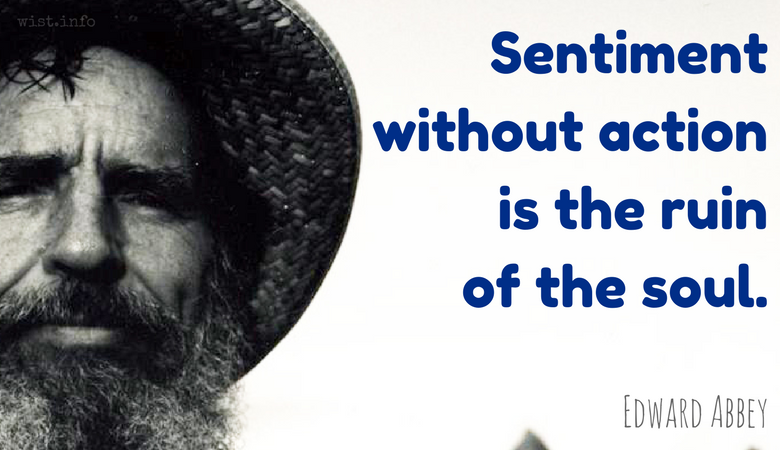He that waits upon Fortune, is never sure of a Dinner.
Benjamin Franklin (1706-1790) American statesman, scientist, philosopher, aphorist
Poor Richard (1734 ed.)
(Source)
Quotations about:
inaction
Note not all quotations have been tagged, so Search may find additional quotes on this topic.
Do nothing, only keep agitating, debating; and things will destroy themselves.
Thomas Carlyle (1795-1881) Scottish essayist and historian
The French Revolution: A History, Part 1, Book 6, ch. 3 (1.6.3) (1837)
(Source)
On the inactivity of the elected National Assembly leading up to the Revolution.
But if you have a fear of unpopularity, is that arising from the imputation of vigour and boldness, or that arising from that of inactivity and indecision most to be feared? When Italy is laid waste by war, when cities are attacked and houses in flames, do you not think that you will be then consumed by a perfect conflagration of hatred?
[Sed si quis est invidiae metus, non1 est vehementius severitatis ac fortitudinis invidia quam inertiae ac nequitiae pertimescenda. An, cum bello vastabitur Italia, vexabuntur urbes, tecta ardebunt, tum te non existimas invidiae incendio conflagraturum]
Marcus Tullius Cicero (106-43 BC) Roman orator, statesman, philosopher
Orationes in Catilinam [Catilinarian Orations], No. 1, § 11, cl. 29 (1.11.29) (63-11-08 BC) [tr. Yonge (1856)]
(Source)
Speaking (aloud, rhetorically) to himself about his concerns of public reaction to his acting so passionately against Cataline's conspiracy.
(Source (Latin)). Alternate translations:
But if there be any fear of Envy, is the Censure of Severity and Courage more greatly to be feared, than that of Baseness and Cowardise? Do you not think, when Italy shall be made desolate with War, the Cities plundered, the Houses a-fire, you shall then fall under a flagrant Envy?
[tr. Wase (1671)]
If fear is to operate, which do you think is most to be dreaded, reproach for cowardice, or censure for magnanimity? When Italy is laid waste; when her cities are taken by storm; when her temples and mansions are wrapt in flames; it is then your danger will begin; it is then that the clamours of mankind will be loud against you.
[tr. Sydney (1795)]
But if there is any fear of odium, whether should the odium resulting from severity and determinati0on be dreaded more violently than that of indolence and wickedness? Whether, when Italy shall be ravaged by war, when the cities shall be harassed, when roofs shall be burning, dost thou not think that thou then will burn with a conflagration of odium?
[tr. Mongan (1879)]
But if there is any fear of envy (displeasure), whether is the envy of severity and of fortitude to be feared more violently, than (that) of inactivity and of negligence? Whether, when Italy shall be devastated with war, cities shall be burned, roofs (houses) shall be on fire: dost thou think thyself not (to be) about to burn then with a conflagration of envy (unpopularity)?
[tr. Underwood (1885)]
But if there is any fear of ill will, is the ill will because of strictness and courage to be feared more strongly, than (that) because of inactivity and negligence? When Italy shall be devastated with war, cities shall be harassed, roofs [houses] shall burn: do you think (you) yourself will not (about to) be consumed then with a conflagration of ill will?
[tr. Dewey (1916)]
If the question of inviting disapproval arises at all, the unpopularity resulting from firmness and determination is no more to be dreaded than the opprobrium produced by culpable failure to act. For when Italy is to be ravaged by war, when cities are assaulted and houses gutted by fire, do you not see how utterly the flames of hatred will consume you then?
[tr. Grant (1960)]
But if there is any fear of hatred, it is not hatred of harshness and firmness requiring to be feared more violently than (hatred) of idleness and worthlessness. Or when Italy is laid waste to, the cities will be harassed, the buildings will burn, then do you not think that you will be consumed by burning hatred?
[IB Notes]
In the face of evil, detachment is a dubious virtue.
Barbara Grizzuti Harrison (1934-2002) American journalist, essayist, memoirist
“Budapest, Winter 1989,” The Astonishing World (1992)
(Source)
DEXTER: I’d rather do something and make a mistake, than be frightened into doing nothing. That’s the problem back home. Folks have been conned into thinking they can’t change the world. Have to accept what is. I’ll tell you something, my friends, the world is changing every day. The only question is, who’s doing it?
J. Michael (Joe) Straczynski (b. 1954) American screenwriter, producer, author [a/k/a "JMS"]
Babylon 5, 3×20 “And the Rock Cried Out, No Hiding Place” (14 Oct 1996)
See Straczynski.
The moral is that it is probably better not to sin at all, but if
some kind of sin you must be pursuing,Well, remember to do it by doing rather than by not doing.
Ogden Nash (1902-1971) American poet
“Portrait of the Artist as a Prematurely Old Man” (1959)
(Source)
It is common knowledge to every schoolboy and even every Bachelor of Arts,
That all sin is divided into two parts.
One kind of sin is called a sin of commission, and that is very important
And it is what you are doing when you are doing something you ortant.
And the other kind of sin is just the opposite and is called a sin of omission and is equally bad in the eyes of all right-thinking people, from Billy Sunday to Buddha,
And it consists of not having done something you shudda.
Silence in the face of evil is itself evil; God will not hold us guiltless. Not to speak is to speak. Not to act is to act.
Dietrich Bonhoeffer (1906-1945) German Lutheran pastor, theologian, martyr
(Spurious)
Frequently attributed to Bonhoeffer, but not found in his works. The origins of its attribution are discussed here, and the phrasing seems to more or less originate with Robert K. Hudnut, A Sensitive Man and the Christ (1971).
Sentiment without action is the ruin of the soul.
Edward Abbey (1927-1989) American anarchist, writer, environmentalist
A Voice Crying in the Wilderness, ch. 4, “Life and Death and All That” (1989)
(Source)
Sometimes incorrectly quoted as "Belief without action is the ruin of the soul."
A person may cause evil to others not only by his actions but by his inaction, and in either case he is justly accountable to them for the injury.
John Stuart Mill (1806-1873) English philosopher and economist
On Liberty, ch. 1 “Introductory” (1859)
(Source)
My doctrine is this, that if we see cruelty or wrong that we have the power to stop, and do nothing, we make ourselves sharers in the guilt.
Anna Sewell (1820-1878) English novelist
Black Beauty, Part 3, ch. 33 “Dolly and a Real Gentleman” (1877)
(Source)
Things said or done long years ago,
Or things I did not do or say
But thought that I might say or do,
Weigh me down, and not a day
But something is recalled,
My conscience or my vanity appalled.William Butler Yeats (1865-1939) Irish poet and dramatist
“Vacillation,” st. 4 (1932), The Winding Stair and Other Poems (1933)
(Source)
Man’s greatest strength is shown in standing still.
Edward Young (1683-1765) English poet
The Complaint: Or, Night Thoughts, Vol. 2, No. 8 “Night the Eighth: Virtue’s Apology,” l. 922 (1745-03) (1748)
(Source)
As we must account for every idle Word, so must we likewise for every idle Silence.
Thomas Fuller (1654-1734) English physician, preacher, aphorist, writer
Introductio ad Prudentiam, # 575 (1725)
(Source)
He who does not punish evil commends it to be done.
Leonardo da Vinci (1452-1519) Italian artist, engineer, scientist, polymath
Note-books (1508-1518)
(Source)
In some versions, this is translated as "commands it to be done."
In fact generally, doing well by others is more characteristic of virtue than being done well by, and doing things positively honourable than forbearing to do things dishonourable.
[τῆς γὰρ ἀρετῆς μᾶλλον τὸ εὖ ποιεῖν ἢ τὸ εὖ πάσχειν, καὶ τὰ καλὰ πράττειν μᾶλλον ἢ τὰ αἰσχρὰ μὴ πράττειν]
Aristotle (384-322 BC) Greek philosopher
Nicomachean Ethics [Ἠθικὰ Νικομάχεια], Book 4, ch. 1 (4.1.7) / 1120a.11 (c. 325 BC) [tr. Chase (1847)]
(Source)
(Source (Greek)). Alternate translations:
For virtue rather shows itself in treating others as we ought, than in being treated as we ought; and in doing noble acts, rather than in abstaining from disgraceful acts.
[tr. Williams (1869)]
For it is more truly distinctive of virtue to be the author than to be the recipient of benefactions, and to do what is noble than to abstain from doing what is shameful.
[tr. Welldon (1892)]
For it is more distinctive of virtue to do good to others than to have good done to you, and to do what is noble than not to do what is base.
[tr. Peters (1893)]
For it is more characteristic of virtue to do good than to have good done to one, and more characteristic to do what is noble than not to do what is base.
[tr. Ross (1908)]
Virtue is displayed in doing good rather than in having good done to one, and in performing noble acts rather than in avoiding base ones.
[tr. Rackham (1934)]
The good man thinks it more blessed to give than to receive, and virtue is more clearly shown in the performance of fine actions than in the non-performance of base ones.
[tr. Thomson (1953)]
Virtue consists more in doing good than in receiving it, and more in doing fine actions than in refraining from disgraceful ones.
[tr. Thomson/Tredennick (1976)]
For it is more proper to virtue to do good than to receive good, and more proper to do fine actions than not to do shameful ones.
[tr. Irwin (1999)]
For it is more characteristic of virtue to do good than to receive it, and to do noble actions than not to do shameful ones.
[tr. Crisp (2000)]
Cf. the Bible, Acts 20:35 [KJV]:
I have shewed you all things, how that so labouring ye ought to support the weak, and to remember the words of the Lord Jesus, how he said, It is more blessed to give than to receive.
It is the greatest of all mistakes to do nothing because you can only do little. Do what you can.
Sydney Smith (1771-1845) English clergyman, essayist, wit
Elementary Sketches of Moral Philosophy, Lecture 19 “On the Conduct of the Understanding, Part 2” (1849)
(Source)
Based on a lecture in a series given at the Royal Institution (1804-1806).
We will have to repent in this generation not merely for the vitriolic words and actions of the bad people, but for the appalling silence of the good people. We must come to see that human progress never rolls in on wheels of inevitability. It comes through the tireless efforts and persistent work of men willing to be co-workers with God, and without this hard work time itself becomes an ally of the forces of social stagnation. We must use time creatively, and forever realize that the time is always ripe to do right.
Martin Luther King, Jr. (1929-1968) American clergyman, civil rights leader, social activist, preacher
Letter from Birmingham Jail (16 Apr 1963)
(Source)
A great deal of talent is lost to the world for want of a little courage. Every day sends to their graves obscure men whose timidity prevented them from making a first effort.
Sydney Smith (1771-1845) English clergyman, essayist, wit
Elementary Sketches of Moral Philosophy, Lecture 9 “On the Conduct of Understanding” (1849)
(Source)
Based on a lecture in a series given at the Royal Institution (1804-1806).
To see the right and not do it is cowardice.
[見義不爲、無勇也。]
Confucius (c. 551- c. 479 BC) Chinese philosopher, sage, politician [孔夫子 (Kǒng Fūzǐ, K'ung Fu-tzu, K'ung Fu Tse), 孔子 (Kǒngzǐ, Chungni), 孔丘 (Kǒng Qiū, K'ung Ch'iu)]
The Analects [論語, 论语, Lúnyǔ], Book 2, verse 24 (2.24.2) (6th C. BC – AD 3rd C.) [tr. Soothill (1910)]
(Source)
(Source (Chinese)). Alternate translations:
To see what is right and not to do it is want of courage.
[tr. Legge (1861)]
It is (moral) cowardice to leave undone what one perceives to be right to do.
[tr. Jennings (1895)]
To see what is right and to act against one's judgment shows a want of courage.
[tr. Ku Hung-Ming (1898)]
To see justice and not act upon it is cowardice.
[tr. Pound (1933)]
To see what is right and not do it is cowardice.
[tr. Waley (1938)]
It is cowardice to fail to do what is right.
[tr. Ware (1950)]
Faced with what is right, to leave it undone shows a lack of courage.
[tr. Lau (1979)]
To see what is right and not to do it is cowardice.
[tr. Dawson (1993)]
To not act when justice commands, that is cowardice.
[tr. Leys (1997)]
To see something you ought to do and not to do it is want of courage.
[tr. Huang (1997)]
To see something you ought to do and not to do it is want of courage.
[tr. Huang (1997)]
One does not do the righteous things when one sees them, it is not brave.
[tr. Cai/Yu (1998), #40]
Failing to act on what is seen as appropriate [yi] is a want of courage.
[tr. Ames/Rosemont (1998)]
If he sees what is right but does not do it, he lacks courage.
[tr. Brooks/Brooks (1998)]
And to recognize a Duty without carrying it out is mere cowardice.
[tr. Hinton (1998)]
To see what is right, but to fail to do it, is to be lacking in courage.
[tr. Slingerland (2003)]
To see what is right and not do it is cowardly.
[tr. Watson (2007)]
Faced with what is right yet doing nothing about it shows a lack of courage.
[tr. Chin (2014)]
Being aloof from a righteous obligation is cowardice.
[tr. Li (2020)]
Life is made up of constant calls to action, and we seldom have time for more than hastily contrived answers; to follow one’s hunch is usually better than lying doggo, and rough generalizations that have worked well in the past easily easily take on the authority of universals. It does violence to our inner being to be obliged to give a hearing to opinions widely at variance with those we are accustomed to, and to come to a conclusion unweighted by desire.
Learned Hand (1872-1961) American jurist
“At Fourscore,” speech, Harvard Club of New York (1952-01-18)
(Source)
First published in the Harvard Alumni Bulletin (23 Feb 1952).
These miserable ways
The forlorn spirits endure of those who spent
Life without infamy and without praise.
They are mingled with that caitiff rabblement
Of the angels, who rebelled not, yet avowed
To God no loyalty, on themselves intent.
Heaven chased them forth, lest, being there, they cloud
Its beauty, and the deep Hell refuses them,
For, beside these, the wicked might be proud.[Questo misero modo
tegnon l’anime triste di coloro
che visser sanza ’nfamia e sanza lodo.
Mischiate sono a quel cattivo coro
de li angeli che non furon ribelli
né fur fedeli a Dio, ma per sé fuoro.
Caccianli i ciel per non esser men belli,
né lo profondo inferno li riceve,
ch’alcuna gloria i rei avrebber d’elli.]Dante Alighieri (1265-1321) Italian poet
The Divine Comedy [Divina Commedia], Book 1 “Inferno,” Canto 3, l. 34ff (3.34-42) [Virgil] (1309) [tr. Binyon (1943)]
(Source)
This passage is likely the basis for John F. Kennedy's famous paraphrase, which he credited to Dante:
The hottest places in hell are reserved for those who in a period of moral crisis maintain their neutrality.
That was originally written (and ascribed to Dante) by Henry Powell Spring in 1944. JFK used it multiple times, including in a speech as President in Germany a few days before his famous "Ich bin ein Berliner" speech. (More info on this paraphrase here.)
Dante (and, thus, Dante's cosmos) judges based on action. Thus he ranks those who would not act, pusillanimous neutrals both earthly and heavenly, as worse than even those who have acted for evil ends, and the first whose punishment we get to see. Though they committed no evil acts, they also failed to commit good ones, allowing evil to flourish. Even the tortured denizens of Hell would consider themselves their betters, thus their not being allowed in that infernal realm. Rejecting Heaven and Hell, they are blocked from either. While undergoing some corporal punishment, far worse is that, having stood only for themselves, they are robbed of their identity, nameless for all eternity (ll. 46-51).
Compare this sentiment to Revelation 3:15-16:
I know thy works, that thou art neither cold nor hot: I would thou wert cold or hot. So then because thou art lukewarm, and neither cold nor hot, I will spue thee out of my mouth.
(Source (Italian)). Alternate translations:
These doleful Beings, he reply'd, have liv'd
In Indolence, without or blame or praise.
Angels are mix'd with this unhappy band,
Who neither Rebels, nor yet faithful were
To God, but liv'd sequestered by themselves.
These Heavn' discarded for being too remiss,
Nor did e'en Hell this lukewarm herd receive;
That Favour might not to the damnn'd be shewn.
[tr. Rogers (1782), ll. 30-37]
Behold th' ignoble sons of sloth and shame,
Who scorn'd alike the voice of praise and blame,
Nor dreaded punishment, nor sought reward.
Mingled they march with that degen'rate brood,
Who when the Rebel of the sky withstood
His sov'reign Lord, aloof their squadrons held:
Viewing with selfish eye the fierce debate,
Till, from the confines of the heav'nly state,
Trembling they saw the rebel host expell'd.
Nor bore the victor-Lord the alien race,
But straight, the foul pollution to efface,
Hurl'd them indignant from the bounds of light:
This frontier then the dastard crew receiv'd,
Nor deeply damn'd, altho' of bliss bereav'd,
And doom'd to wander on the verge of night';
They suffer here, lest yon' more guilty train
of crimes unequal, doom'd to equal pain,
Blaspheming Heavn'n, should make their impious boast.
[tr. Boyd (1802), st. 8-11]
This miserable fate
Suffer the wretched souls of those, who liv'd
Without or praise or blame, with that ill band
Of angels mix'd, who nor rebellious prov'd
Nor yet were true to God, but for themselves
Were only. From his bounds Heaven drove them forth,
Not to impair his lustre, nor the depth
Of Hell receives them, lest th' accursed tribe
Should glory thence with exultation vain.
[tr. Cary (1814)]
The miserable crew
Of souls now lingers in this piteous mood,
To whom, alive, nor blame nor praise was due.
Commingled are they with that caitiff brood
Of angel natures, which nor dared rebel,
Nor yet kept faith, but selfish ends pursued.
Them, not to be less fair, must heaven expel,
Nor the abyss receive, lest their dispraise
Redound for glory to the sons of hell.
[tr. Dayman (1843)]
This miserable mode the dreary souls of those sustain, who lived without blame, and without praise.
They are mixed with that caitiff choire of the angels, who were not rebellious nor were faithful to God; but were for themselves.
Heaven chased them forth to keep its beauty from impair; and deep Hell receives them not, for the wicked wouild have some glory over them.
[tr. Carlyle (1849)]
This miserable lot
Possess the souls of those whose living days
Passed not with infamy, nor yet with praise.
Immingled they are in the caitiff choir
Of neutral angels, for themselves that stood --
Neither rebelled nor loyal were to God.
The heavens have chased them, for they'd sully heaven --
The infernal depths receive them not, because
No glory can the wicked have by those.
[tr. Bannerman (1850)]
This state of misery is held
By the sad spirits of those, who in their lives
Knew neither act of infamy nor praise.
And they are mingl'd with the wicked choir
Of Angels who, not rebels to their God,
Were yet not faithful, knowing but themselves;
Cast forth that Heav'n's pure beauty be not stain'd,
nto Hell's gloomy depths permitted not
Lest they be cause of glory to the lost.
[tr. Johnston (1867)]
This miserable mode
Maintain the melancholy souls of those
Who lived withouten infamy or praise.
Commingled are they with that caitiff choir
Of Angels, who have not rebellious been,
Nor faithful were to God, but were for self.
The heavens expelled them, not to be less fair;
Nor them the nethermore abyss receives,
For glory none the damned would have from them.
[tr. Longfellow (1867)]
This wretched fashion keep the sorry souls of those who lived without infamy and without praise. They are mingled with that caitiff band of the angels who were not rebel, nor were faithful to God, but were for themselves. Heaven chased them, that it should not be less fair, nor does the deep hell receive them, since the damned would have some boasting of them.
[tr. Butler (1885)]
After this fashion drear
These wretched souls their after-life pursue
Who both from infamy and praise lived clear.
Mingled they are with that contemptible crew
Of angels who would not rebellion dare,
Not faithful Godwards, to themselves but true.
Heaven drove them out, lest it might be less fair,
Neither received them deepest Hell's domain,
That from them, evil should no glory share.
[tr. Minchin (1885)]
This miserable measure the wretched souls maintain of those who lived without infamy and without praise. Mingled are they with that caitiff choir of the angels, who were not rebels, nor were faithful to God, but were for themselves. The heavens chased them out in order to be not less beautiful, nor doth the depth of Hell receive them, because the damned would have some glory from them.
[tr. Norton (1892)]
Such hapless state the joyless souls of those sustain, who lived their lives untouched by either infamy or praise. They are huddled together with that base crew of angels who rose not in revolt, nor kept their faith with God, but were for self alone. Heaven drave them out that its brightness might remain undimmed; nor doth the depth of Hell receive them, for the damned would glory over them.
[tr. Sullivan (1893)]
This miserable condition
Keeps the sad souls of those who in their lifetime
Were without infamy and without praises;
Commingled are they with that caitiff chorus
Of angels who aforetime were not rebels.
Nor faithful were to God, but stood as neutral.
Heaven drave them forth lest they should mar its beauty;
Nor doth the lower depth of hell receive them,
Since that from them the damned would gain some glory.
[tr. Griffith (1908)]
This miserable state is borne by the wretched souls of those who lived without disgrace and without praise. They are mixed with that caitiff choir of the angels who were not rebels, nor faithful to God, but were for themselves. The heavens drove them forth, not to be less fair, and the depth of Hell does not receive them, lest the wicked have some glory over them.
[tr. Sinclair (1939)]
This dismal company
Of wretched spirits thus find their guerdon due
Whose lives knew neither praise nor infamy;
They're mingled with that caitiff angel-crew
Who against God rebelled not, nor to Him
Were faithful, but to self alone were true;
Heaven cast them forth -- their presence there would dim
The light; deep Hell rejects so base a herd,
Lest sin should boast itself because of them.
[tr. Sayers (1949)]
These are the nearly soulless
whose lives concluded neither blame nor praise.
They are mixed here with that despicable corps
of angels who were neither for God nor Satan,
but only for themselves. The High Creator
scourged them from Heaven for its perfect beauty,
and Hell will not receive them since the wicked
might feel some glory over them.
[tr. Ciardi (1954), ll. 32-39]
Such is the miserable condition of the sorry souls of those who lived without infamy and without praise. They are mingled with that base band of angels who were neither rebellious nor faithful to God, but stood apart. The heavens drive them out, so as not to be less beautiful; and deep Hell does not receive them, lest the wicked have some glory over them.
[tr. Singleton (1970)]
This wretched state of being
is the fate of those sad souls who lived a life
but lived it with no blame and with no praise.
They are mixed with that repulsive choir of angels
neither faithful nor unfaithful to their God,
but undecided in their neutrality.
Heaven, to keep its beauty, cast them out,
but even hell itself would not receive them
for fear the wicked there might glory over them.
[tr. Musa (1971)]
This miserable way
is taken by the sorry souls of those
who lived without disgrace and without praise.
They now commingle with the coward angels,
the company of those who were not rebels
nor faithful to their God, but stood apart.
The heavens, that their beauty not be lessened,
have cast them out, nor will deep Hell receive them --
even the wicked cannot glory in them.
[tr. Mandelbaum (1980)]
That is the manner of existence
Endured by the sad souls of those who lived
Without occasion for infamy or praise.
They are mixed with that abject squadron of angels
Who did not think it worth their while to rebel
Or to be faithful to God, but were for themselves.
Heaven chased them out, so as not to become less beautiful,
And the depths of hell also rejected them,
Lest the evil might find occasion to glory over them.
[tr. Sisson (1981)]
This is the sorrowful state of souls unsure,
Whose lives earned neither honor nor bad fame.
And they are mingled with angels of that base sort
Who, neither rebellious to God nor faithful to Him,
Chose neither side, but kept themselves apart --
Now Heaven expels them, not to mar its splendor,
And Hell rejects them, lest the wicked of heart
Take glory over them.
[tr. Pinsky (1994), ll. 30-37]
This wretched measure is kept by the miserable souls who lived without infamy and without praise.
They are mixed with that cowardly chorus of angels who were not rebels yet were not faithful to God, but were for themselves.
The heavens reject them so as not to be less beautiful, nor does deep Hell receive them, for the wicked would have some glory over them.
[tr. Durling (1996)]
This is the miserable mode in which those exist, who lived without praise, without blame. They are mixed in with the despised choir of angels, those not rebellious, not faithful to God, but for themselves. Heaven drove them out, to maintain its beauty, and deep Hell does not accept them, lest the evil have glory over them.
[tr. Kline (2002)]
This awful habitat is given
over to the "so-so souls" who, when they lived,
were neither cold nor hot.
They share this region with a retinue
of neutral angels, those who neither were for God
nor Satan, but for you-know-who.
To keep its reputation from impair,
Heaven expelled them; they were barred from Hell,
in case in case the wicked thought themselves more fair."
[tr. Carson (2002)]
This baleful condition is one, he said
that grips those souls whose lives, contemptibly,
were void alike of honor and ill fame.
These all co-mingle with a noisome choir
of angels who -- not rebels, yet not true
to God -- existed for themselves alone.
To keep their beauty whole, the Heavens spurned them.
Nor would the depths of Hell receive them in,
lest truly wicked souls boast over them.
[tr. Kirkpatrick (2006)]
This miserable state is borne
by the wretched souls of those who lived
without disgrace yet without praise.
They intermingle with that wicked band
of angels, not rebellious and not faithful
to God, who held themselves apart.
Loath to impair its beauty, Heaven casts them out,
and the depth of Hell does not receive them
lest on their account the evil angels gloat.
[tr. Hollander/Hollander (2007)]
This is how the vilest,
Sorriest souls have lived their lives,
Neither disgraced nor ever once admired.
Mixed among them are souls thrown from on high,
Angels who neither joined the Devil's rebellion
Nor stood with God. They simply stayed to the side.
Heaven rejected them as ugly, and Hell
Refused to let them in its deeper parts,
Outshining demons if the Devil let them dwell there.
[tr. Raffel (2010)]
Their pride to have no prejudice,
Seeking no praise for fear of taking blame,
They were for nothing, nor were they against:
They made no waves and so they made no name.
Now their neutrality is recompense,
For here there is no cautious holding back:
Voices once circumspect are now incensed
And raise to make each other's eardrums crack
Thus they are joined to that self-seeking squad
Of angels fitted neither to rebel
Against, nor put their heartfelt faith in, God --
Hunted from Heaven and locked out of Hell
Because the perfect sky would brook no blur,
And in the lower depths the rebels prized
The glory won from being what they were,
Not the nonentities that they despised.
[tr. James (2013), ll. 44-59]





























